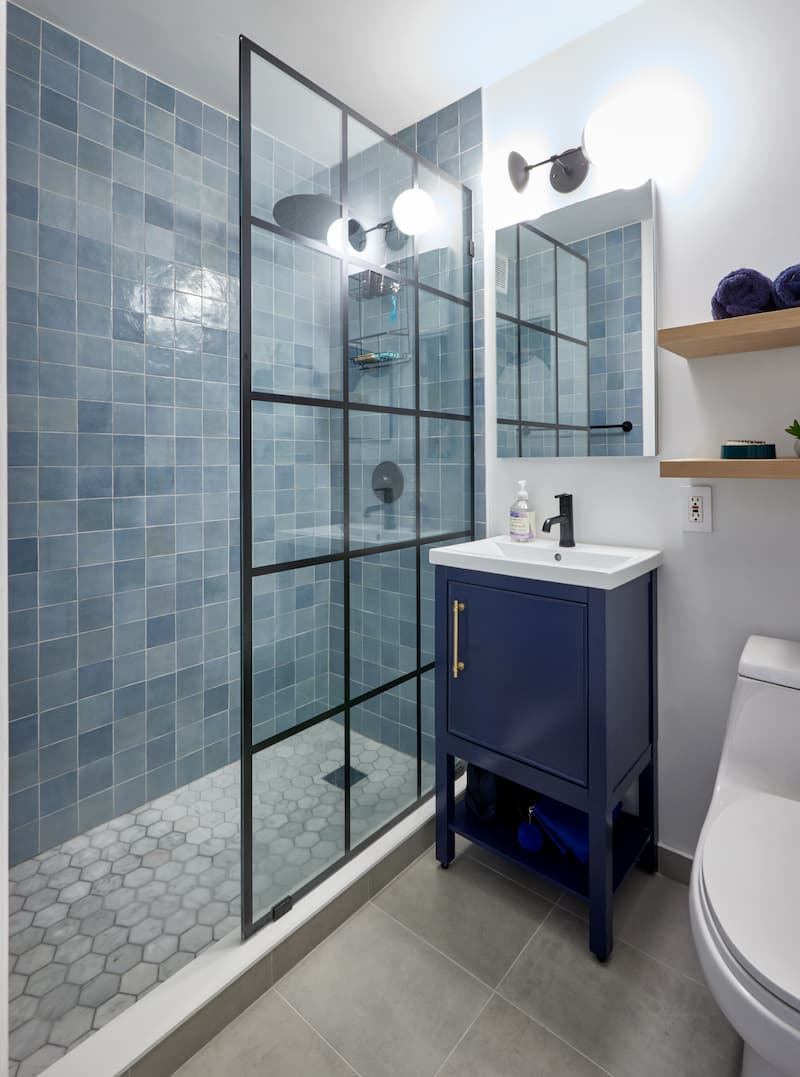From Sky to Slate: How to Design a Stylish Blue Tile Bathroom
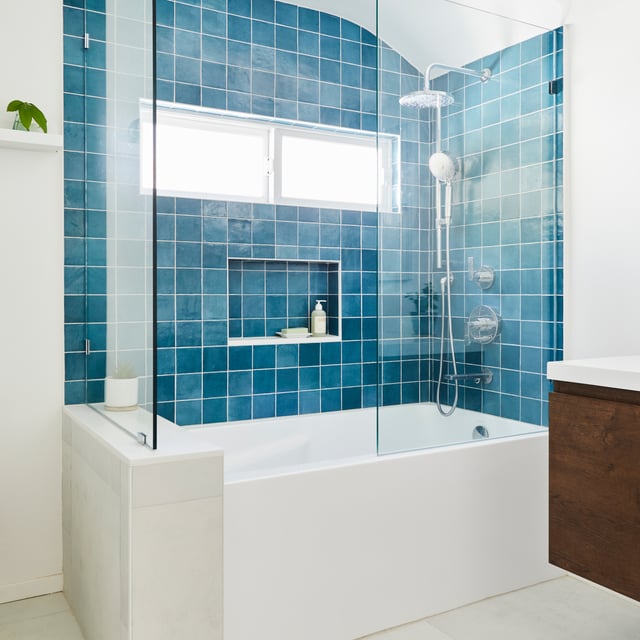
In This Article
Blue has a way of settling the mind. The right shade reflects light in the morning when you need a lift and softens into something steady at night when the house quiets down. It sits comfortably beside porcelain, chrome, wood, and stone, which makes it a reliable partner no matter your style.
A blue tile bathroom can be breezy and bright or deep and enveloping—the color gives you room to decide how you want the space to feel.
Blue tiled bathroom design tips
Choose blue bathroom tiles with varying gradients
A single, flat tone runs the risk of feeling flat. Introduce subtle variation—handmade-look ceramics, zellige-style glazes, or a blend of neighboring shades—and the surface starts to come alive. Light bounces differently from tile to tile, adding depth without noise. In a compact room, that gentle shift creates dimension and keeps the eye interested without pulling attention away from the rest of the design.
 See how this New York home features blue tiles
See how this New York home features blue tiles
Use white grout for a clean, sharp appearance
White grout frames each blue bathroom tile, creating crisp lines that read fresh and intentional. It amplifies geometry, so even simple layouts feel architectural. There are practical considerations, too. White grout can highlight soap scum and mildew if ventilation is poor, so pair it with a high-quality, stain-resistant grout and plan for regular, gentle maintenance. On floors, consider a slightly warmer white or off-white to soften contrast with navy or cobalt and to better disguise everyday wear. For more pointers, read our grout color guide.
 View how this bathroom uses blue tiles with white grout
View how this bathroom uses blue tiles with white grout
Select sky blue for a playful, uplifting bathroom
Sky blue reflects light and lifts the mood, so a compact bath feels open and friendly. It can read retro and playful—think mid-century soda-pop tile or a breezy coastal nod—which makes it a natural fit for a kids bathroom that still feels universal. Pair it with polished nickel or chrome for a bright, airy sparkle, or switch to matte black hardware for a touch of edge. If you want a color that’s cheerful rather than loud, sky blue hits that sunny, polished sweet spot.
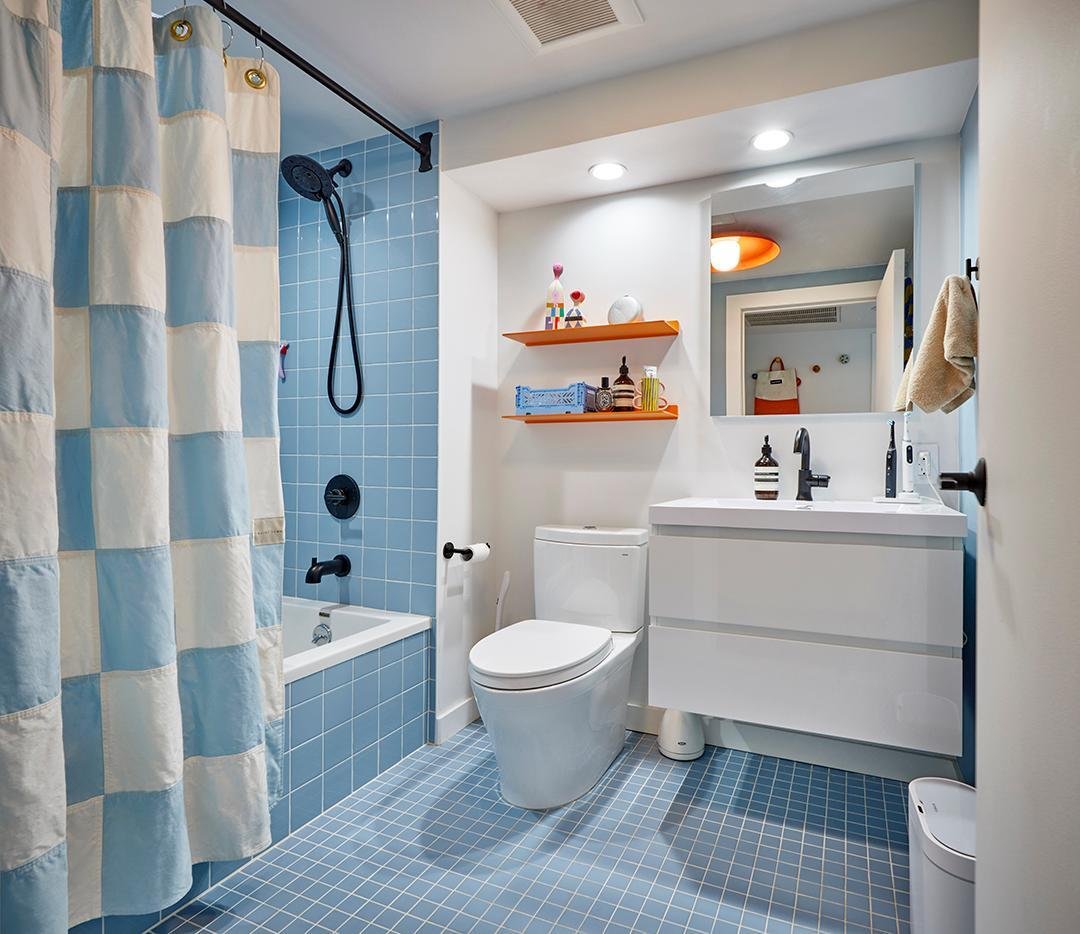
Check out this fun bathroom remodel
Consider pale or pastel blues for a calming effect
Pale blues—powder, mist, and mineral shades—create a soft backdrop that invites quiet routines. These tones excel with natural textures like white oak, linen, and unlacquered brass, which add warmth without crowding the palette. If your goal is a spa-like feel that doesn’t skew cold, a pastel blue wall tile with warm neutrals is a reliable recipe.
 Explore how this Brooklyn bathroom embraces pastels
Explore how this Brooklyn bathroom embraces pastels
Contrast blue tiles with orange accents
Blue and orange sit opposite on the color wheel, which is why even a small hit of orange can awaken a tiled bathroom’s blue scheme. Terra-cotta, copper, or a tangerine towel introduces warmth and a focal point without overpowering the tile. For a modern mix, keep the room mostly blue and white, then add one or two orange moments to spark the contrast.
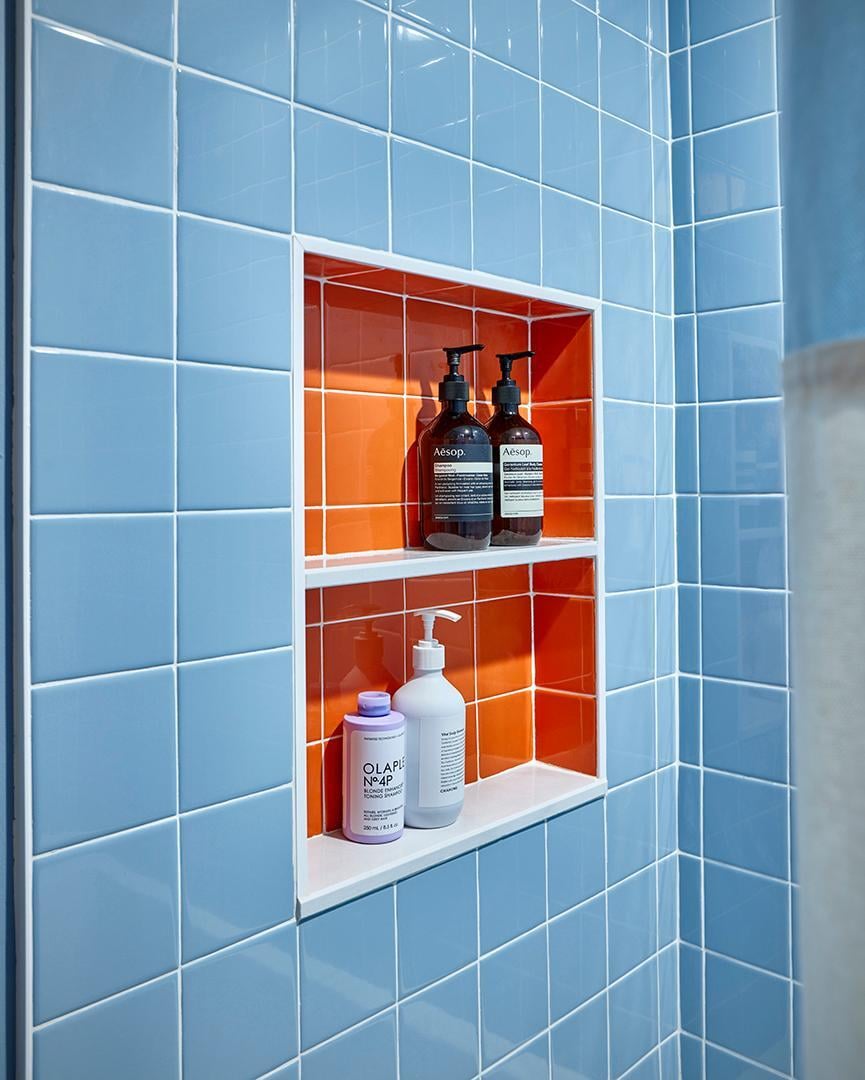
Find inspiration in this modern Brooklyn bathroom
Juxtapose blue tiles with wood’s warmth
Blue tile brings precision and durability; wood brings texture and welcome warmth. A walnut bathroom vanity can ground cobalt walls, while white oak keeps pastel blues feeling sunlit and relaxed. The combination reads balanced—cool, clean surfaces where you need them and natural material where it matters to the touch.
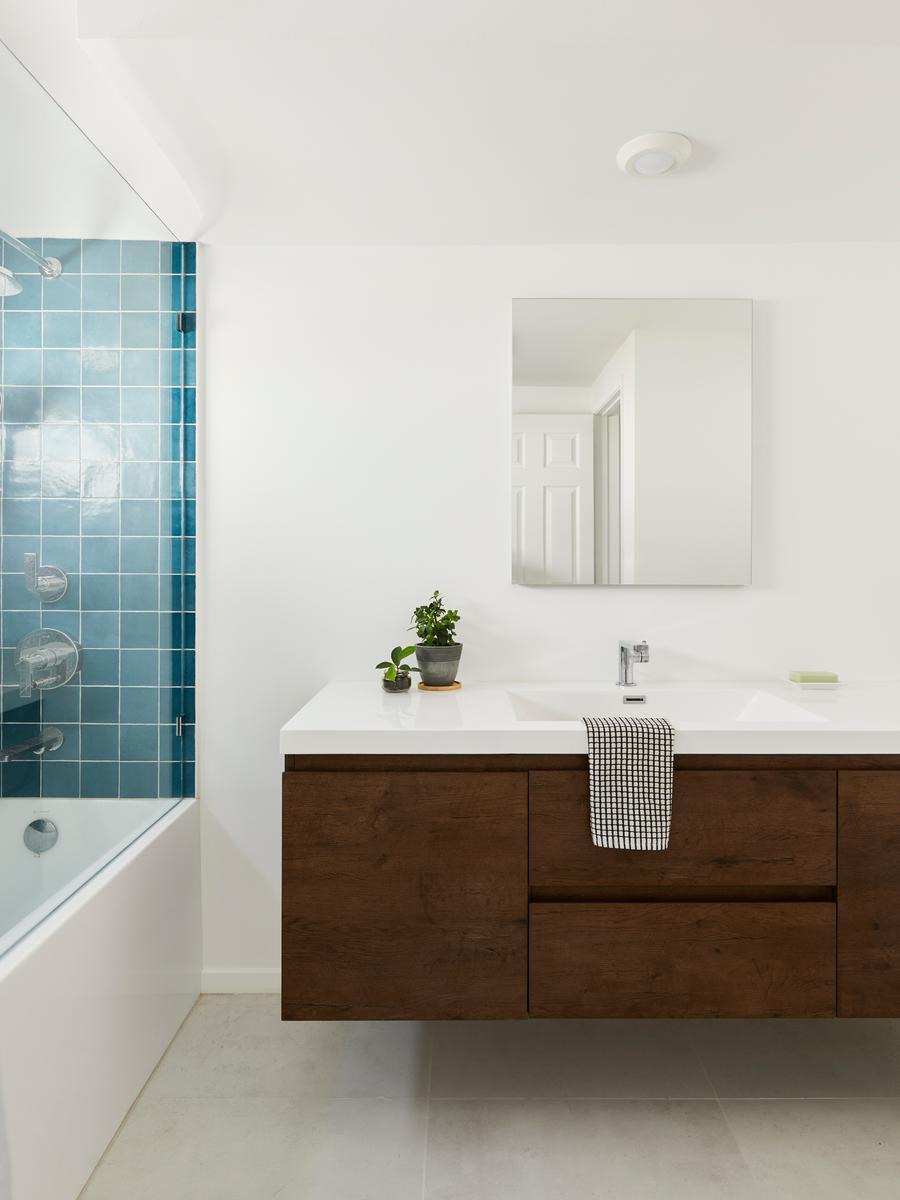
See how this remodeled bathroom strikes the right balance
Choose non-rectangular tiles for added visual intrigue
Shape alone can carry a design, especially in a restrained palette. Triangular, hex, fan, fish scale, and small-format mosaics introduce pattern through geometry, echoing water and movement in a blue tiled bathroom. If you want character without extra colors, a distinctive shape in a single blue tone will do a lot of work for you.
 Be inspired by this luxury bathroom with blue mosaic tiles
Be inspired by this luxury bathroom with blue mosaic tiles
Choosing the right blue tiles
Glossy vs. matte blue bathroom tiles
Advantages of glossy bathroom tiles: Glossy tiles bounce light, making low-light bathrooms feel brighter and more spacious. They are generally easy to clean on walls and shower surrounds, and glossy glazes often show beautiful depth, especially in mid to deep blues. The surface can highlight subtle color variation tile-to-tile, which brings a handcrafted feel even with machine-made options.
Disadvantages of glossy bathroom tiles: High shine can emphasize minor surface irregularities, glare may feel busy in small rooms with many angles, and glossy floors are often slippery when wet, so reserve them for walls or use slip-rated finishes.
Advantages of matte bathroom tiles: Matte tiles cut glare and create a soft, composed look that feels calm in person. They tend to hide water spots and fingerprints better than high-gloss, and many matte porcelains offer excellent slip resistance for bathroom floors.
Disadvantage of matte bathroom tiles: Colors can appear more muted in matte, particularly with darker blues. Plus, soap residue may hang on a bit longer if cleaning is infrequent.
Perfect Every Detail of Your Bathroom
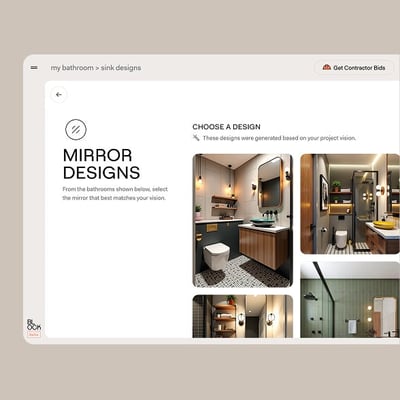
Setting the tone with the right shade of blue
- Pale, light blues: Feels airy and restorative. These tints of blue pair easily with white, light wood, and soft stone for coastal, Scandinavian, or spa-inspired themes.
- Powdery gray-blues: Feels tailored and composed. This shade of bathroom tiles pair well with marble veining, polished nickel, and shaker profiles for a quietly classic space.
- Saturated light blues: Feels fresh and optimistic without shouting. The tiles will sing with graphic black-and-white accents and simple hardware for modern or transitional bathrooms.
- Rich aqua blues: Feels lively and reminiscent of clear water. They match well with warm brass, rattan details, and travertine for a relaxed, resort-like mood.
- Cobalt or royal blues: Feels confident and architectural. With white grout and chrome, they create a crisp blue and white tile bathroom that looks sharp from every angle.
- Teal and blue-green blends: Feels sophisticated with a natural depth. They balance nicely with walnut, aged brass, and handcrafted textures for a collected look ideal for art deco bathrooms that often feature intricate tilework.
- Dark blues: Feels grounding and dramatic. Keep the bathroom inviting by pairing them with pale stone, warm wood, generous lighting, and, if needed, a lighter ceiling to lift the space.
How tile size changes the look and feel of your blue bathroom
Bigger tiles calm things down and simplify the view; smaller tiles add texture, sparkle, and grip. Choosing between them is about how you want the room to feel day to day.
Large-format blue tiles read calm and spacious. With fewer grout lines, deep navy or cobalt lands as a smooth, confident field, and lighter sky blues feel open and airy. The eye travels in longer strokes, so walls and floors look cleaner and more expansive.
Small blue tiles bring texture and energy. Mosaics and tight grids break up the color, catching light so pastels shimmer and saturated blues sparkle. They also add traction and wrap curves neatly around niches, benches, and shower pans.
For more guidance, read our guide to the pros and cons of large vs. small tiles.
Bring Your Dream Bathroom to Life
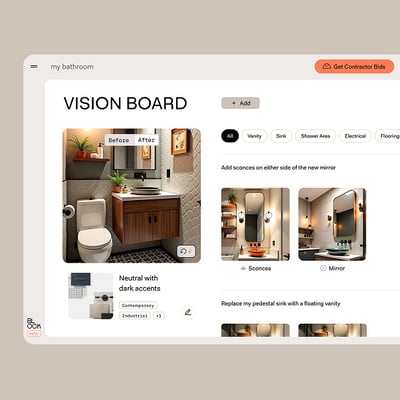
How Block Renovation helps refine and build your vision
Renovation goes better with clarity—on design, budget, and build. Block Renovation brings planning tools, vetted contractors, transparent proposals, and progress-based payments so you can move from inspiration to installation with confidence. You stay focused on the look and feel; your team stays aligned on scope, schedule, and quality.
Still in the daydreaming phase? Try our AI bathroom remodel visualizing tool. Experiment with blue tile shades and patterns and see how choices affect costs before you talk to a contractor. Save options, compare finishes, and share renders so everyone is picturing the same outcome.
Ready to execute on your vision for your blue tiled bathroom? We can introduce you to highly qualified remodeling teams. Start by telling us about your space and goals once. You’ll get matched with local contractors, receive side-by-side proposals with expert scope review to catch gaps early, and make payments through a secure, progress-based system.

Written by Block Renovation
Frequently Asked Questions
Are blue bathroom tiles a good idea for small bathrooms?
How do I prevent my blue tiled bathroom from feeling too dark?
What tile materials are most durable for bathrooms?
Porcelain is the workhorse: dense, low-porosity, and highly durable for floors and showers; ceramic works well on walls; natural stone adds character but typically needs sealing and more maintenance; glass can be stunning for accents but shows water spots and requires careful installation.

Renovate confidently with Block
Easily compare quotes from top quality contractors, and get peace of mind with warranty & price protections.
Thousands of homeowners have renovated with Block

4.5 Stars (100+)

4.7 Stars (100+)

4.5 Stars (75+)
Renovate confidently
- Top quality contractors
- Warranty & price protections
- Expert resources

